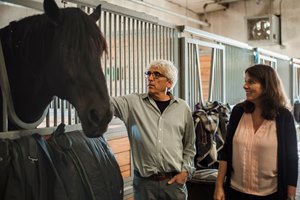Published Study Finds Equine-Assisted Therapy Effective


An eight-week study of patients with post-traumatic stress disorder who participated in equine-assisted therapy found evidence at the neurobiological level that such programs are effective in treating the ailment, which may occur in people who have experienced or witnessed a harrowing event.
Columbia University Irving Medical Center and New York State Psychiatric Institute researchers, under the auspices of the Man O' War Project, published the findings in a new study in Human Brain Mapping, "Neural changes following equine‐assisted therapy (EAT) for post-traumatic stress disorder: A longitudinal multimodal imaging study."
The Man O' War Project is the first university-led research study to examine the effectiveness of equine-assisted therapy in treating veterans with PTSD. Founded in 2015 by philanthropist, businessman, and ambassador Earle I. Mack, a veteran himself and longtime Thoroughbred owner/breeder, the project was born out of his concern about the mental health crisis facing veterans and his observation of anecdotal stories from various equine-assisted therapy groups, yet no hard science to support their results.
Mack noted this is the second time scientific results have been published and a third is planned. Mack said that while he never was called into combat, veterans who saw such action have always had a special place in his heart.
"It's really satisfying to see," Mack said. "I love the veterans we're helping and I love the horses. And this has the potential to help many others, including children, suffering from PTSD."
State-of-the-art technology was used to look at changes in brain regions key to fear and emotional processing. Dr. Yuval Neria, who led the Columbia team with Dr. Prudence Fisher, said the MRI data showed remarkable results.
"The results provide the first-of-its-kind proof that equine-assisted treatment may have not only clinical promise," Neria said, "but also brain based changes that may increase a patient's capacity to enjoy life despite facing traumas and war adversities, which makes this treatment so unique."
A Firmer Footing for Retired Horses, Veterans
According to the study, "baseline, pretreatment caudate connectivity significantly correlated with clinical improvement, suggesting enhanced reward responsiveness may underlie the improvements seen in subjects with PTSD after EAT treatment. PTSD is a heterogeneous disorder that has been shown to include symptoms related to diminished reward circuitry responsivity that can impact social and emotional responses. Improving reward circuitry might be a significant, initial step to finding new and enhanced methods to treat this complex disorder."
Dr. Xi Zhu, assistant professor of clinical neurobiology, and first author on the paper said, "This project provides the first neurobiological evidence of the effectiveness of equine-assisted therapy for treating veterans and civilians who suffer from PTSD."
Fisher said the study holds promise that equine-assisted therapy has the potential to improve quality of life for people affected by PTSD.
"The results from this study are very exciting for the hundreds of thousands of Americans who suffer from PTSD," said Fisher, Associate Professor at Columbia Psychiatry, who co-led the study with Neria, Professor at Columbia Psychiatry. "The results provide the first-of-its-kind proof that equine-assisted treatment may have not only a clinical promise but also brain based changes that may increase a patient's capacity to enjoy life despite facing traumas and war adversities, which make this treatment so unique," said Neria, senior author of this study.
Jeffrey Lieberman, chair of Columbia Psychiatry, commended the Mack Foundation for the inspiration and funding for the innovative study. Mack noted the importance of the financial support of The Jockey Club and others within racing.
Among the others providing principal funding for the study were the David and Julia Koch Foundation; Ganek Family Foundation; Gerald Parsky; Gulfstream Park Racing Association; The Jockey Club; Live Oak Foundation; Mary and Daniel Loughran Foundation; Meta Aerospace Capital; Nicholson Family Charity Fund; Peter M. Brant; Reid Family Charitable Fund; Tactical Air Support; and Viola Foundation.
